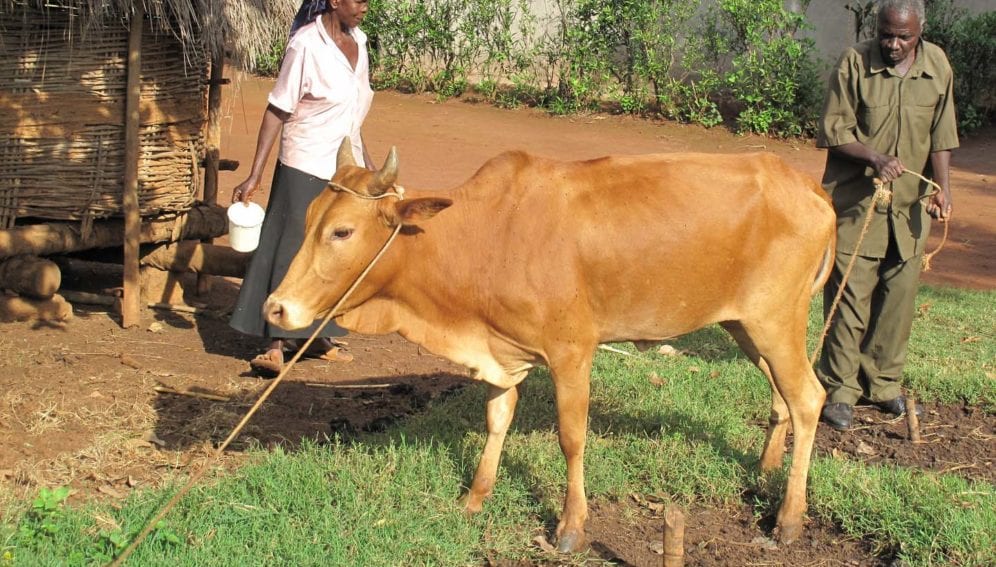By: Joel Winston
Send to a friend
The details you provide on this page will not be used to send unsolicited email, and will not be sold to a 3rd party. See privacy policy.
Political will and farmer involvement are crucial to direct research and innovation on biotechnologies that could cut poverty in rural areas of developing nations, says an editor of a report by the UN’s Food and Agriculture Organization (FAO).
The report, ‘Biotechnologies at Work for Smallholders’, published on 29 October, outlines 19 examples from studies done in the developing world of biotechnology being used to boost yields and lower production costs in the small-scale farming of crops, livestock and fish.
Andrea Sonnino, chief of the FAO’s Research and Extension Unit and one of the report’s editors, tells SciDev.Net that the political determination to direct biotech efforts including research and innovation towards helping smallholders is crucial. But, he adds, so is farmers’ involvement.
“This publication provides evidence that, when there is the political commitment, when there is the willingness to apply direct research and extension to meeting the needs of smallholders and when there is full participation of the smallholders themselves, important results can be achieved,” he says.
Involving farmers in innovation projects from the beginning helps to assure their success, Sonnino says.
“By being involved, they participate in the selection of the objectives and in the development of the research and innovation activities,” he says. “This results in an innovation which is targeted towards the real needs of the smallholders, with an adoption process that is much more rapid because of the farmers’ ownership.”
“When there is the political commitment, when there is the willingness to apply direct research and extension to meeting the needs of smallholders and when there is full participation of the smallholders themselves, important results can be achieved.”
Andrea Sonnino, FAO
The report says that new science-based agricultural products and processes offer ways to help eliminate hunger and malnutrition, but the need for them to recognise the role of smallholder production and improve people’s lives is “now more pressing than ever”.
Sonnino tells SciDev.Net: “In developing countries, most food production comes from small or medium-sized farms — the family farm. So to meet the increasing demand for food, we need to focus on smallholders.”
The examples in the report come from Argentina, Bangladesh, Brazil, Cameroon, China, Colombia, Cuba, Ghana, India, Nigeria, South Africa, Sri Lanka, Tanzania and Thailand.
They include various small-scale applications of biotechnologies, but projects involving genetically modified organisms were excluded to prevent the debate about this contentious issue from distracting attention from other valuable biotechnologies, according to Sonnino.
The report describes DNA-based technologies such as marker-assisted selection, which uses genetic markers to select crop or animal varieties with particular traits for breeding, and polymerase chain reaction, a technique that was used last year to detect outbreaks of a viral disease in goats and sheep in Cameroon.
Yet the evidence of economic, health and environmental impacts — while obvious for a few studies — was lacking in most cases. Also, there was a lack of data on the number of farmers involved in taking up some of the innovations, the report says.
Biotechnologies showing the greatest impacts and uptake were found to have had robust support through national and state government policies, and were also supported by international funding.
These included Indian examples of the development of improved pearl millet hybrids that boosted the revenue of farmers in two states by US$13.5 million in 2011, and flood-tolerant rice that three million farmers were using in 2012. Both were supported by government programmes targeting crop improvement, poverty alleviation and climate change, and were funded by bodies including the UK’s Department for International Development and the Bill & Melinda Gates Foundation, the report says.
The FAO is calling for political commitments to improve smallholder productivity, and international investment in science and technology to overcome weak institutions and skills in the field of biotechnology.
“To help more smallholders benefit from biotechnology, we need to invest more in public goods, research and innovation, extension services and technical assistance to farmers,” Sonnino tells SciDev.Net.
“It has been demonstrated that the returns on this kind of investment are much higher than investment in other sectors.”
Joanna Chataway, co-director of the Innogen Institute, a UK research centre that studies the social and economic impact of genomics innovation, tells SciDev.Net: “This research is a further contribution to important studies indicating that biotechnologies can have positive impacts for smallholder farmers. The case studies provide insight into how the technical, institutional and operational barriers and opportunities can be best overcome and exploited.”














